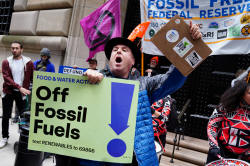The U.S. Federal Reserve's take on greening the economy: Not our job
 Send a link to a friend
Send a link to a friend
 [November 02, 2021] By
Ann Saphir and Lindsay Dunsmuir [November 02, 2021] By
Ann Saphir and Lindsay Dunsmuir
(Reuters) - The U.S. Federal Reserve trails
other major central banks in tackling climate change, even as President
Joe Biden pledges a "whole of government" approach and fights to salvage
his ambitious climate agenda as global leaders meet in Glasgow to hash
out responses to rising world temperatures.
In recent years the Fed has only begun to look at how changing weather
patterns impact its ability to do its job, which includes safeguarding
the financial system through bank regulation, and combating economic
shocks through monetary policy.
And while it is devoting more effort to studying climate-related
impacts, it treats climate risk as just another element that affects the
economic and financial landscape, like trade or childcare policy, rather
than as anything the Fed might try to shape.
That puts it well behind its peers who are gearing up to buy green
assets, crack down on fossil-fuel lending, and push companies toward
lower-carbon choices.
The hesitance to prioritize action on climate risk at the world's most
powerful central bank will have consequences, analysts and activists
say, not just for the U.S. economy but for a global financial system
whose largest actors are in New York.

"If [the U.S.] are laggards, it won't be good for our markets, it won't
be good for our companies," said Sanjay Patnaik, a Brookings Institution
fellow specializing in climate policies. "The U.S. doesn't want to fall
behind, or our financial system will be more vulnerable to climate
risk."
Fed policymakers could catch up relatively quickly "if they engage
fully," he said, particularly by implementing stress tests to gauge
banks' vulnerability to climate risks such as higher temperatures or
exposure to loans financing fossil fuel. The Bank of England has already
started such testing, with a view to using the results to nudge banks to
be better prepared.
Such tests could fall under the Fed's own remit for financial stability
and Fed officials have said they will explore the possibility. But,
leery of blowback on what is a fraught U.S. political issue, they
maintain it's up to Congress, not them, to incentivize businesses to go
green.
As Fed Chair Jerome Powell summed it up this summer: "We are not and we
don't seek to be climate policymakers as such."
LETTING OTHERS LEAD
In the past year, the Bank of England and the European Central Bank have
released comprehensive plans to help manage the transition to a greener
economy, including using their asset-buying clout to selectively benefit
less-polluting companies.
By contrast, the Fed, central bank to the largest greenhouse-gas
producing country, remains stuck near the starting gate. It was the last
major central bank to sign up to the Network for Greening the Financial
System when it joined in December 2020, and has only just begun an
effort to analyze financial-stability risks from climate change, but so
far embracing no new policies to address it.

"When I think about why are other banks ahead of us really – and they
are – it's because in those governments, they decided some years back
that these are critical risks," San Francisco Fed President Mary Daly
said recently. Her bank has several economists leading the charge at the
Fed on climate-change research.
Others such as the ECB and People's Bank of China have started green
bond programs -- purchasing debt to finance environmentally friendly
projects -- to nurture a transition toward alternative energy. The Fed
views such policies as beyond its economic and financial stability
mandates.
[to top of second column] |

A man holds a placard during a protest against the Federal Reserve
about climate change in the Manhattan borough of New York City, New
York, U.S., October 29, 2021. REUTERS/Carlo Allegri

Daly acknowledged that as fire seasons lengthen, droughts deepen, and severe
weather disrupts more economic activity, the Fed may need to respond more
assertively.
"If climate effects occur and they are bridling the growth of our economy and
putting us below our potential, then it would be our job to lean against the
risks," she said, although she added that's different to mitigating climate risk
directly.
The Fed's role is "not to even pull levers that would do that. It's really to be
students of it so we are well prepared," Daly said.
CALLS FOR ACTION
Last Friday, activists demonstrated at many of the regional Fed banks and at the
Fed Board in Washington, demanding more action and the replacement of Powell
with a leader more focused on climate. Powell awaits Biden's decision on whether
to nominate him for a second term, with critics seeing his assertion of climate
change as a "longer-term issue" as a black mark against him.
"What we are pushing for is an aggressive level of regulation that we don't
think he has the appetite for," said Kathleen Brophy, senior strategist at the
Sunrise Project, a youth environmental activist group helping to organize the
protests. "They have definitely stepped up on this issue for sure – but it
doesn't match the urgency."
Others point out the Fed remains caught between an administration with a much
bolder climate change agenda than in the Trump era and a Congress where
Republicans and a few Democrats oppose action on climate change.
Even the small steps taken so far have drawn some rebukes.
In a letter to Daly, Republican Senator Pat Toomey called the bank's
climate-change research "politically charged" and asked the Fed to abandon what
he termed mission creep.
"Such activities are inconsistent with its statutory responsibilities; only
Congress has the authority to reform the Federal Reserve or modify its mission,"
Toomey said.

But while the Fed's mandate is fairly narrow, its responsibilities are wide, and
this is where it can take a stand on climate, analysts say.
"I think the Fed can and should be ahead, in the sense of that it's their job to
supervise banks," said Paul Fisher, a former policymaker at the Bank of England
who coordinated its climate initiatives. "Climate change is clearly a material
threat to the banks and they have to supervise that... supervisors ought be
getting on with this quietly in the background. Most of the banks recognize it's
a financial risk. It shouldn't be that controversial."
And the Fed is forging ahead on its exploratory path. In October it signed on to
a report on climate-related financial risk with other U.S. regulators that, for
the first time, framed global warming as a financial risk.
"That's the major contribution of the...report," Patnaik said. "How do you get
people to care about something? You tell them it's a risk to their livelihood
and their assets."
(Reporting by Ann Saphir and Lindsay Dunsmuir; Editing by Dan Burns and Andrea
Ricci)
[© 2021 Thomson Reuters. All rights
reserved.] Copyright 2021 Reuters. All rights reserved. This material may not be published,
broadcast, rewritten or redistributed.
Thompson Reuters is solely responsible for this content.
 |